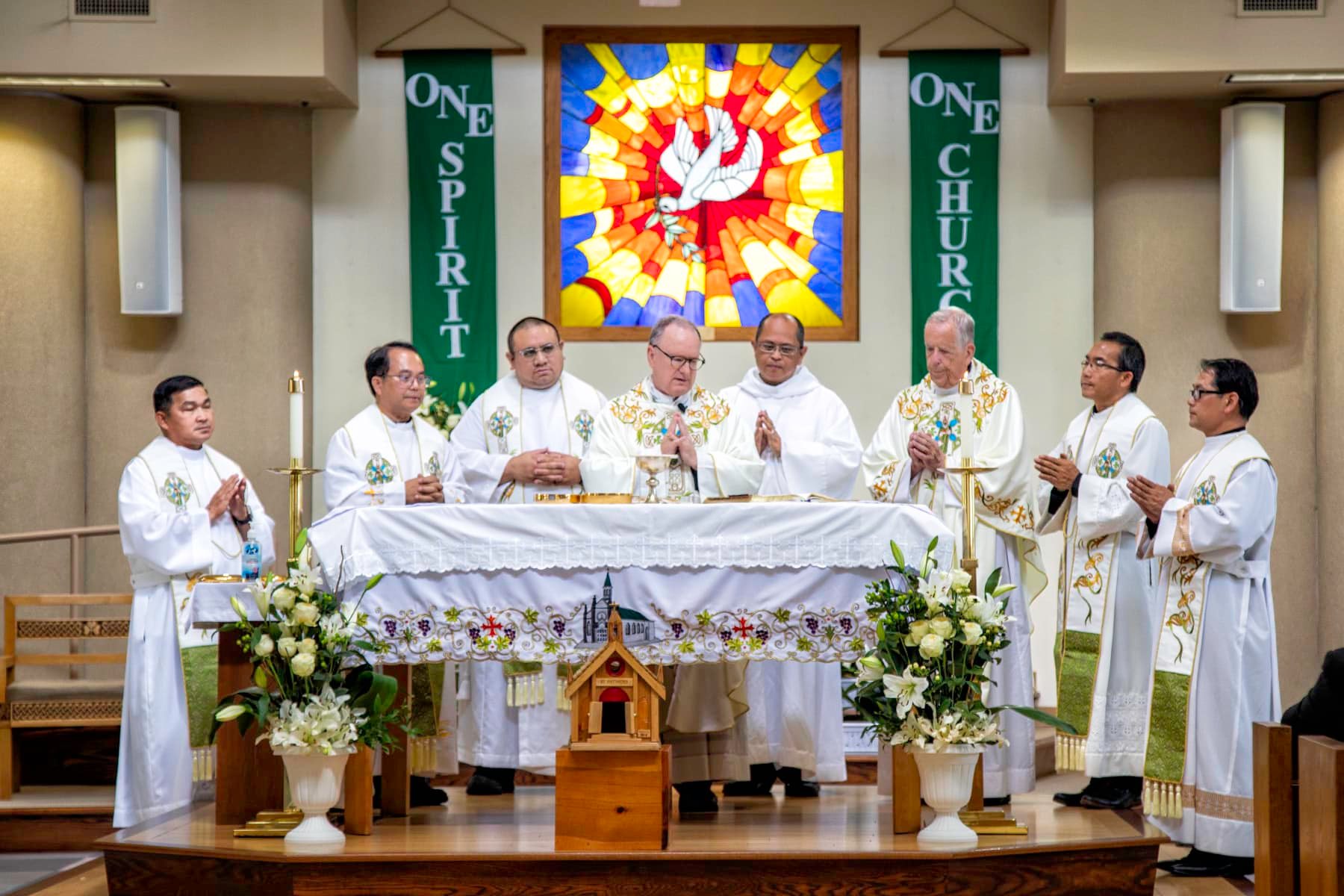
Address: 825 7th St., Rodeo, CA 94572
Phone: (510) 799-4406
Fax: (510) 799-5681
Email: parishoffice@stpatrickrodeo.org
Parish Mission Statement
Through the Gospel Message of Jesus Christ, St. Patrick Parish is the hands, feet, body and heart of Christ, that serves, loves and enlightens others to make God better known.
Pastor: Father Larry Young
If you have any question about the Catholic Faith, please contact Fr. Larry at 510.799.4406 or Email Click Here.
Schedule of Masses
Morning Daily Mass
Monday – Saturday 7:30 am
Confessions
3:30-4:30pm (Saturday) or
By Appointment
Saturday Vigil 5:00pm
Sunday 7:30, 9:30, 11:30am
First Friday of the month
Holy Hour and Benediction
8:00am – 9:00am
Copyright © 2024 · All Rights Reserved · St. Patrick Catholic Church
Nonprofit Website by GivingPress · RSS Feed · Log in
The Sacrament of Confirmation
The Sacrament of Confirmation
Confirmation is the sacrament in which the Holy Spirit comes to us in a special way to join us more closely to Jesus and His Church and to seal and strengthen us as Christ’s witness. We have sacramental prep classes for High School Students and Adults. Please call the Confirmation Office at 510-799-4406 or
email parishoffice@stpatrickrodeo.org
Confirmation Journey (High School)
Sessions Sundays (1:30pm – 2:30pm)
Must successfully complete at least 1yr of Youth Ministry
Confirmation Journey is a process to receive the Sacrament of Confirmation. It is a 2 year process starting with Youth Ministry. Confirmation Journey encourages youth to a deeper relationship with God and to become a disciple of Jesus Christ.
Youth Ministry/LifeTeen (High School, 9th thru 12th)
Classes Sundays (3:00pm – 4:00pm)
Prerequisite for Confirmation
Life Teen leads teenagers and their families into a deeper relationship with Jesus Christ and His Church. By encouraging a deeper & fuller relationship with Jesus Christ, allowing them to experience the love of Jesus, and challenging them to live the Gospel.
For Adult Confirmation call 510-799-4406
Article 2 Catechism of the Catholic Church} (The Holy See)
THE SACRAMENT OF CONFIRMATION
1285 Baptism, the Eucharist, and the sacrament of Confirmation together constitute the “sacraments of Christian initiation,” whose unity must be safeguarded. It must be explained to the faithful that the reception of the sacrament of Confirmation is necessary for the completion of baptismal grace.88 For “by the sacrament of Confirmation, [the baptized] are more perfectly bound to the Church and are enriched with a special strength of the Holy Spirit. Hence they are, as true witnesses of Christ, more strictly obliged to spread and defend the faith by word and deed.”
IN BRIEF
1315 “Now when the apostles at Jerusalem heard that Samaria had received the word of God, they sent to them Peter and John, who came down and prayed for them that they might receive the Holy Spirit; for it had not yet fallen on any of them, but they had only been baptized in the name of the Lord Jesus. Then they laid their hands on them and they received the Holy Spirit” (⇒ Acts 8:14-17).
1316 Confirmation perfects Baptismal grace; it is the sacrament which gives the Holy Spirit in order to root us more deeply in the divine filiation, incorporate us more firmly into Christ, strengthen our bond with the Church, associate us more closely with her mission, and help us bear witness to the Christian faith in words accompanied by deeds.
1317 Confirmation, like Baptism, imprints a spiritual mark or indelible character on the Christian’s soul; for this reason one can receive this sacrament only once in one’s life.
1318 In the East this sacrament is administered immediately after Baptism and is followed by participation in the Eucharist; this tradition highlights the unity of the three sacraments of Christian initiation. In the Latin Church this sacrament is administered when the age of reason has been reached, and its celebration is ordinarily reserved to the bishop, thus signifying that this sacrament strengthens the ecclesial bond.
1319 A candidate for Confirmation who has attained the age of reason must profess the faith, be in the state of grace, have the intention of receiving the sacrament, and be prepared to assume the role of disciple and witness to Christ, both within the ecclesial community and in temporal affairs.
1320 The essential rite of Confirmation is anointing the forehead of the baptized with sacred chrism (in the East other sense-organs as well), together with the laying on of the minister’s hand and the words: “Accipe signaculum doni Spiritus Sancti” (Be sealed with the Gift of the Holy Spirit.) in the Roman Rite, or “The seal of the gift that is the Holy Spirit” in the Byzantine rite.
1321 When Confirmation is celebrated separately from Baptism, its connection with Baptism is expressed, among other ways, by the renewal of baptismal promises. the celebration of Confirmation during the Eucharist helps underline the unity of the sacraments of Christian initiation.
https://www.vatican.va/archive/ENG0015/__P3V.HTM{Catechism of the Catholic Church}
Week at a Glance
Wednesday, November 20
Daily Mass: 7:30am
Our Lady of Perpetual Help Novena, 8:00am
School Mass (Tk-2), 8:30am
Parish Town Hall Meeting in the Hall, 7:00pm
Thursday, November 21
The Presentation of the Blessed Virgin Mary
Daily Mass: 7:30am
Faith Formation and Edge classes, 5:45pm
Friday, November 22
Daily Mass, 7:30am
Santo Niño Novena, 8:00am
School Musical
Saturday, November 23
Daily Mass, 7:30am
Legion of Mary Rosary, 8:00am
Confessions, 3:30pm – 4:30pm
Vigil Mass, 5:00pm
One Collection
Sunday, November 24
Feast of Our Lord Jesus Christ, King of the
Universe
Masses: 7:30am, 9:30am, 11:30am
One Collection
Children’s Liturgy of the Word, 9:30, 11:30
Confirmation Session, 1:30 – 2:30pm
Youth Ministry classes, 3:00-4:00pm